Impact of Media Coverage on Mental Health: A Psychological Analysis
VerifiedAdded on 2022/11/03
|6
|1470
|150
Essay
AI Summary
This essay delves into the multifaceted impact of media coverage on mental health, focusing on how news and entertainment programs influence individuals' psychological well-being. It explores the ways in which media can unintentionally and intentionally affect mental health through exaggerated news, inaccurate information, and the promotion of certain social conventions. The essay discusses the availability heuristic and how media uses it to shape viewers' perceptions, leading to potential miscalibration of events. It examines the role of negative sensationalism, media psychology, and the ethical challenges it poses. The essay concludes by emphasizing the need for media to prioritize interventions that reduce the stigma surrounding mental illness and provide accurate, responsible coverage to mitigate negative impacts, particularly on children and vulnerable audiences.
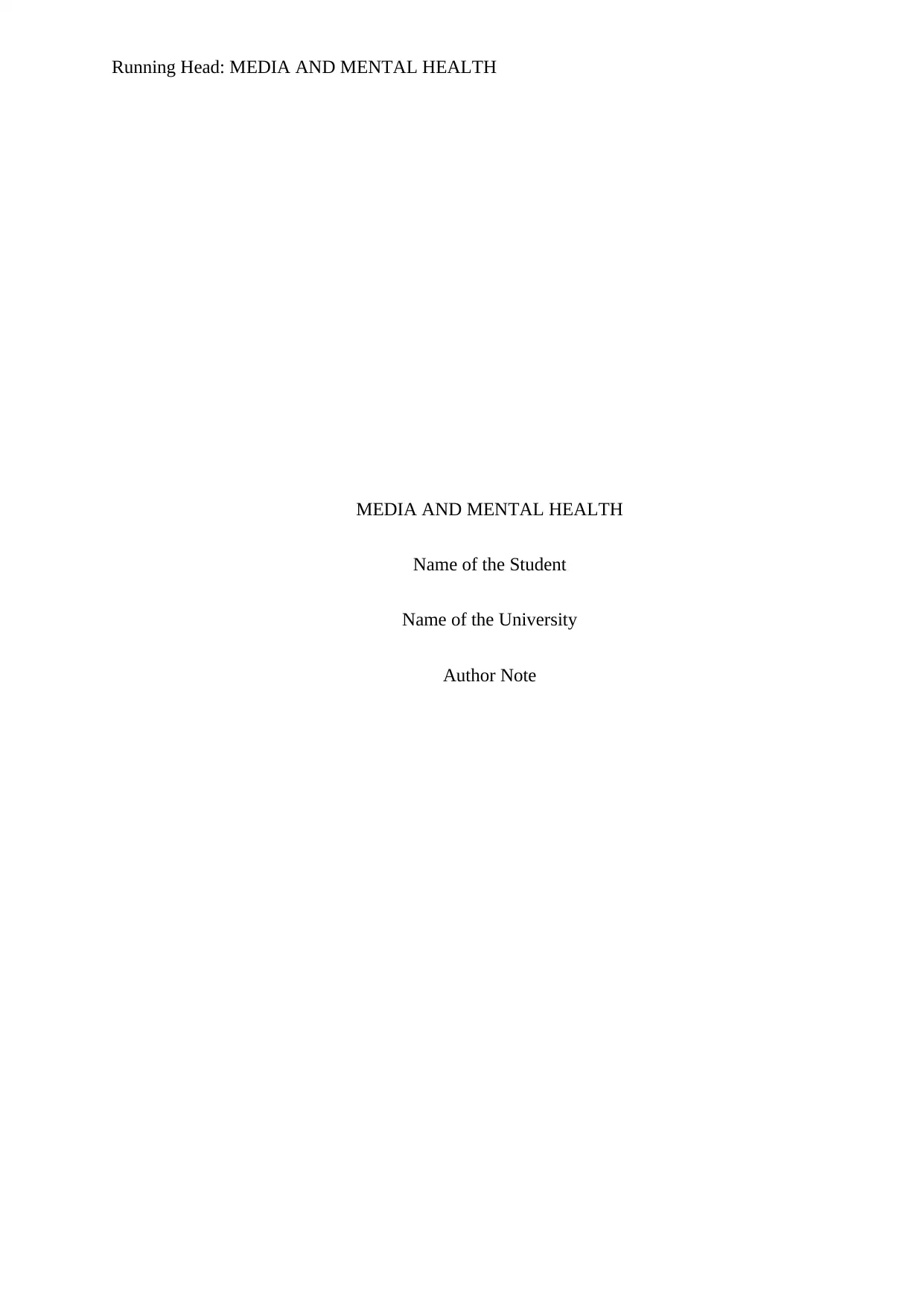
Running Head: MEDIA AND MENTAL HEALTH
MEDIA AND MENTAL HEALTH
Name of the Student
Name of the University
Author Note
MEDIA AND MENTAL HEALTH
Name of the Student
Name of the University
Author Note
Paraphrase This Document
Need a fresh take? Get an instant paraphrase of this document with our AI Paraphraser
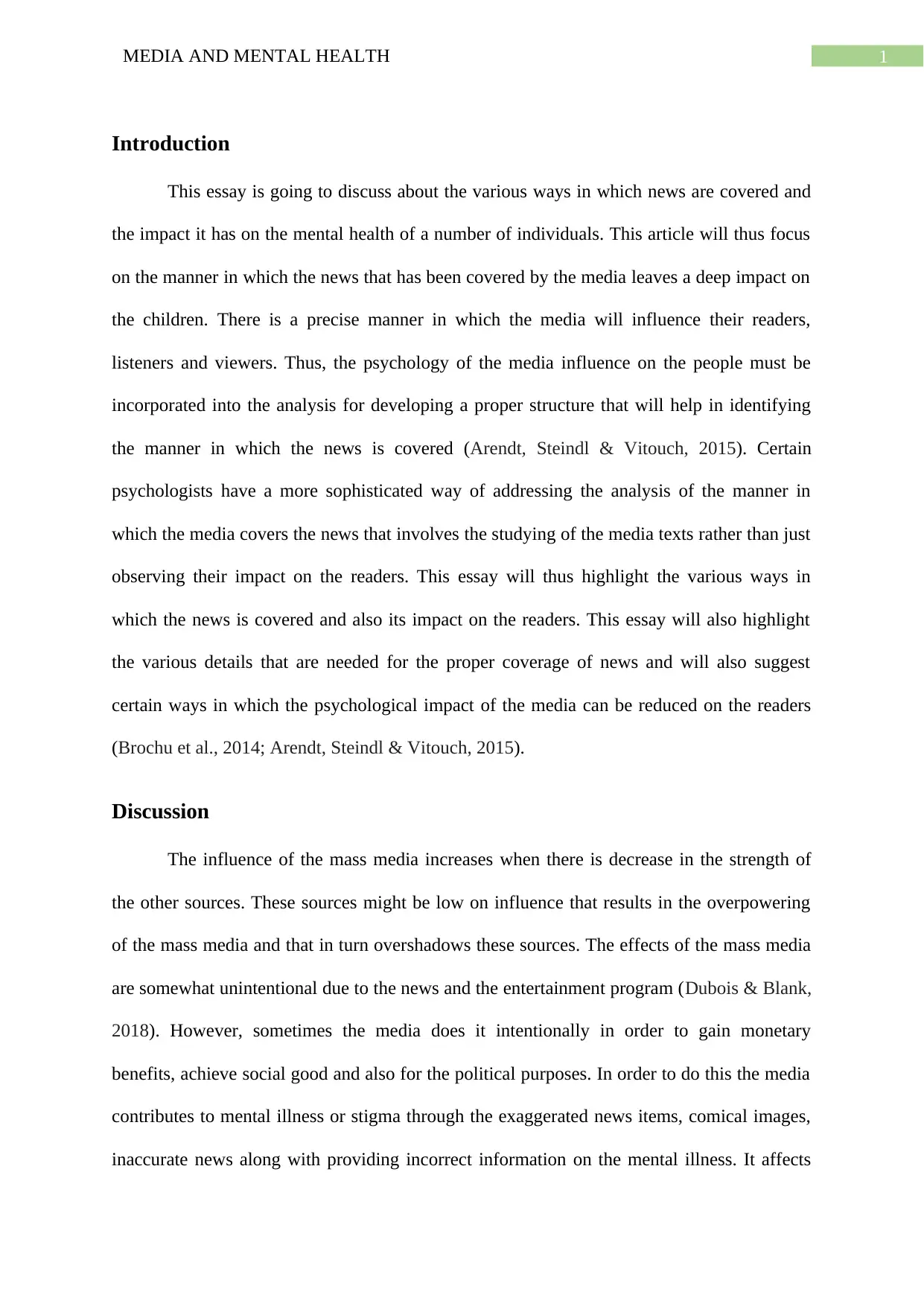
1MEDIA AND MENTAL HEALTH
Introduction
This essay is going to discuss about the various ways in which news are covered and
the impact it has on the mental health of a number of individuals. This article will thus focus
on the manner in which the news that has been covered by the media leaves a deep impact on
the children. There is a precise manner in which the media will influence their readers,
listeners and viewers. Thus, the psychology of the media influence on the people must be
incorporated into the analysis for developing a proper structure that will help in identifying
the manner in which the news is covered (Arendt, Steindl & Vitouch, 2015). Certain
psychologists have a more sophisticated way of addressing the analysis of the manner in
which the media covers the news that involves the studying of the media texts rather than just
observing their impact on the readers. This essay will thus highlight the various ways in
which the news is covered and also its impact on the readers. This essay will also highlight
the various details that are needed for the proper coverage of news and will also suggest
certain ways in which the psychological impact of the media can be reduced on the readers
(Brochu et al., 2014; Arendt, Steindl & Vitouch, 2015).
Discussion
The influence of the mass media increases when there is decrease in the strength of
the other sources. These sources might be low on influence that results in the overpowering
of the mass media and that in turn overshadows these sources. The effects of the mass media
are somewhat unintentional due to the news and the entertainment program (Dubois & Blank,
2018). However, sometimes the media does it intentionally in order to gain monetary
benefits, achieve social good and also for the political purposes. In order to do this the media
contributes to mental illness or stigma through the exaggerated news items, comical images,
inaccurate news along with providing incorrect information on the mental illness. It affects
Introduction
This essay is going to discuss about the various ways in which news are covered and
the impact it has on the mental health of a number of individuals. This article will thus focus
on the manner in which the news that has been covered by the media leaves a deep impact on
the children. There is a precise manner in which the media will influence their readers,
listeners and viewers. Thus, the psychology of the media influence on the people must be
incorporated into the analysis for developing a proper structure that will help in identifying
the manner in which the news is covered (Arendt, Steindl & Vitouch, 2015). Certain
psychologists have a more sophisticated way of addressing the analysis of the manner in
which the media covers the news that involves the studying of the media texts rather than just
observing their impact on the readers. This essay will thus highlight the various ways in
which the news is covered and also its impact on the readers. This essay will also highlight
the various details that are needed for the proper coverage of news and will also suggest
certain ways in which the psychological impact of the media can be reduced on the readers
(Brochu et al., 2014; Arendt, Steindl & Vitouch, 2015).
Discussion
The influence of the mass media increases when there is decrease in the strength of
the other sources. These sources might be low on influence that results in the overpowering
of the mass media and that in turn overshadows these sources. The effects of the mass media
are somewhat unintentional due to the news and the entertainment program (Dubois & Blank,
2018). However, sometimes the media does it intentionally in order to gain monetary
benefits, achieve social good and also for the political purposes. In order to do this the media
contributes to mental illness or stigma through the exaggerated news items, comical images,
inaccurate news along with providing incorrect information on the mental illness. It affects
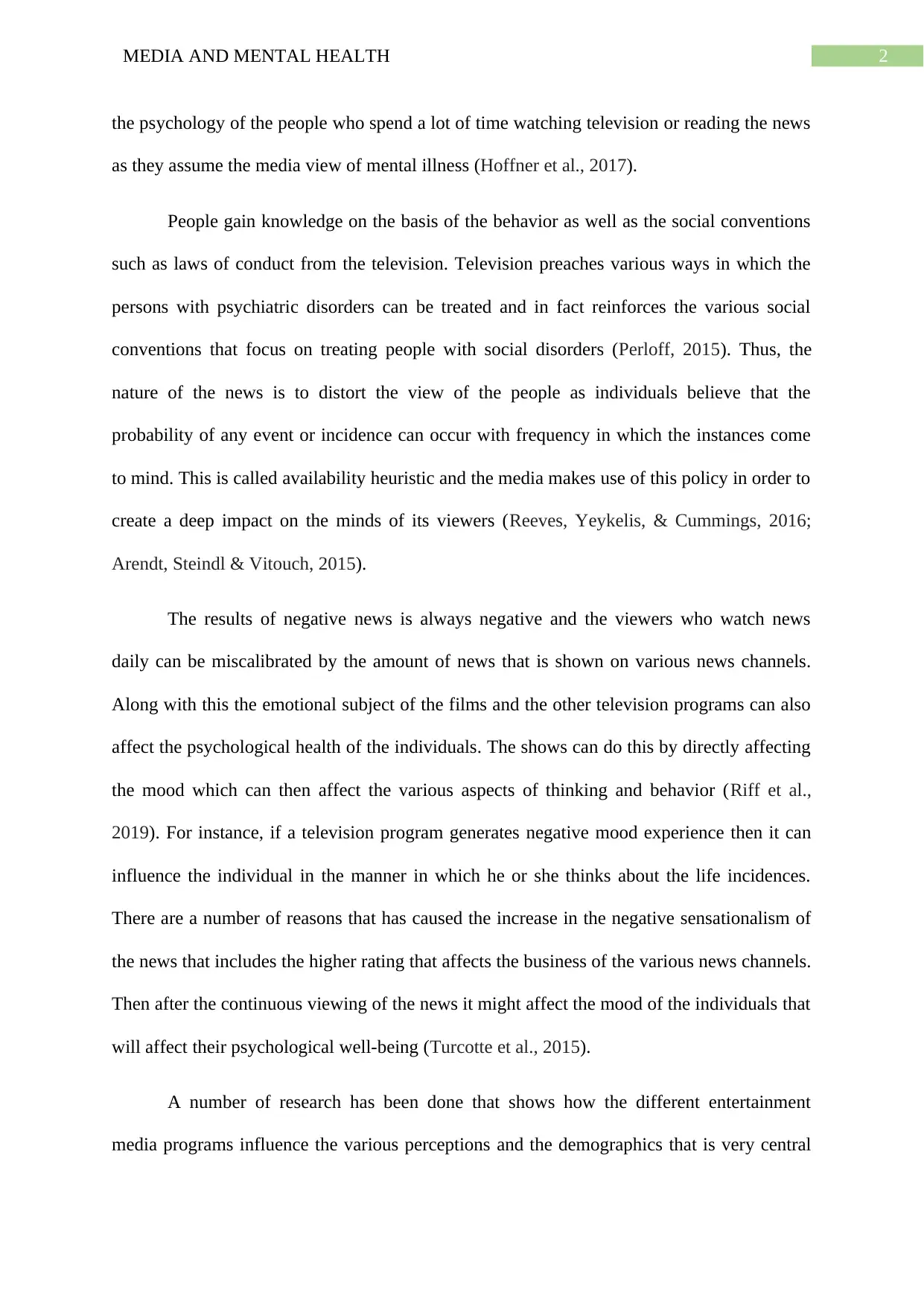
2MEDIA AND MENTAL HEALTH
the psychology of the people who spend a lot of time watching television or reading the news
as they assume the media view of mental illness (Hoffner et al., 2017).
People gain knowledge on the basis of the behavior as well as the social conventions
such as laws of conduct from the television. Television preaches various ways in which the
persons with psychiatric disorders can be treated and in fact reinforces the various social
conventions that focus on treating people with social disorders (Perloff, 2015). Thus, the
nature of the news is to distort the view of the people as individuals believe that the
probability of any event or incidence can occur with frequency in which the instances come
to mind. This is called availability heuristic and the media makes use of this policy in order to
create a deep impact on the minds of its viewers (Reeves, Yeykelis, & Cummings, 2016;
Arendt, Steindl & Vitouch, 2015).
The results of negative news is always negative and the viewers who watch news
daily can be miscalibrated by the amount of news that is shown on various news channels.
Along with this the emotional subject of the films and the other television programs can also
affect the psychological health of the individuals. The shows can do this by directly affecting
the mood which can then affect the various aspects of thinking and behavior (Riff et al.,
2019). For instance, if a television program generates negative mood experience then it can
influence the individual in the manner in which he or she thinks about the life incidences.
There are a number of reasons that has caused the increase in the negative sensationalism of
the news that includes the higher rating that affects the business of the various news channels.
Then after the continuous viewing of the news it might affect the mood of the individuals that
will affect their psychological well-being (Turcotte et al., 2015).
A number of research has been done that shows how the different entertainment
media programs influence the various perceptions and the demographics that is very central
the psychology of the people who spend a lot of time watching television or reading the news
as they assume the media view of mental illness (Hoffner et al., 2017).
People gain knowledge on the basis of the behavior as well as the social conventions
such as laws of conduct from the television. Television preaches various ways in which the
persons with psychiatric disorders can be treated and in fact reinforces the various social
conventions that focus on treating people with social disorders (Perloff, 2015). Thus, the
nature of the news is to distort the view of the people as individuals believe that the
probability of any event or incidence can occur with frequency in which the instances come
to mind. This is called availability heuristic and the media makes use of this policy in order to
create a deep impact on the minds of its viewers (Reeves, Yeykelis, & Cummings, 2016;
Arendt, Steindl & Vitouch, 2015).
The results of negative news is always negative and the viewers who watch news
daily can be miscalibrated by the amount of news that is shown on various news channels.
Along with this the emotional subject of the films and the other television programs can also
affect the psychological health of the individuals. The shows can do this by directly affecting
the mood which can then affect the various aspects of thinking and behavior (Riff et al.,
2019). For instance, if a television program generates negative mood experience then it can
influence the individual in the manner in which he or she thinks about the life incidences.
There are a number of reasons that has caused the increase in the negative sensationalism of
the news that includes the higher rating that affects the business of the various news channels.
Then after the continuous viewing of the news it might affect the mood of the individuals that
will affect their psychological well-being (Turcotte et al., 2015).
A number of research has been done that shows how the different entertainment
media programs influence the various perceptions and the demographics that is very central
⊘ This is a preview!⊘
Do you want full access?
Subscribe today to unlock all pages.

Trusted by 1+ million students worldwide
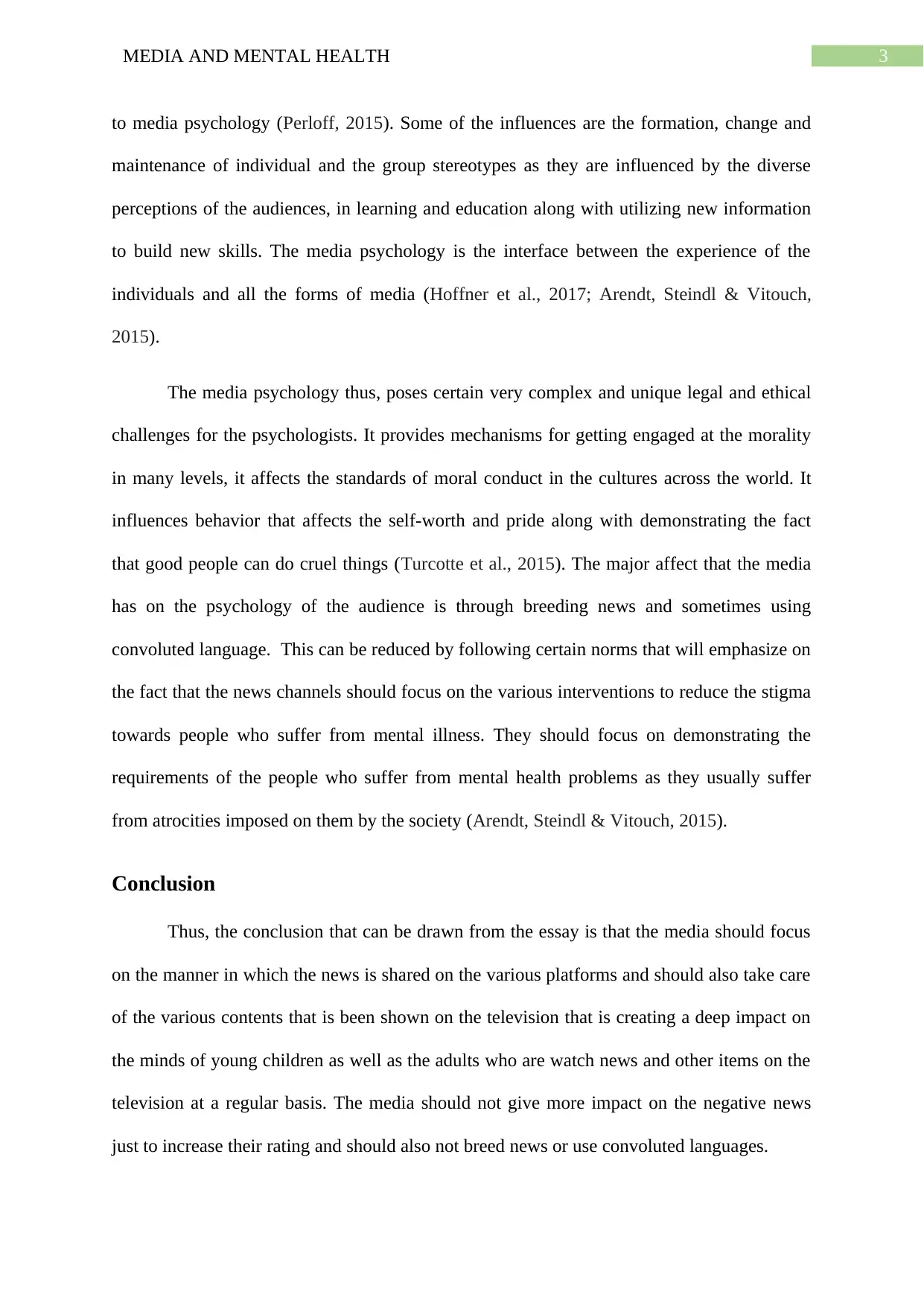
3MEDIA AND MENTAL HEALTH
to media psychology (Perloff, 2015). Some of the influences are the formation, change and
maintenance of individual and the group stereotypes as they are influenced by the diverse
perceptions of the audiences, in learning and education along with utilizing new information
to build new skills. The media psychology is the interface between the experience of the
individuals and all the forms of media (Hoffner et al., 2017; Arendt, Steindl & Vitouch,
2015).
The media psychology thus, poses certain very complex and unique legal and ethical
challenges for the psychologists. It provides mechanisms for getting engaged at the morality
in many levels, it affects the standards of moral conduct in the cultures across the world. It
influences behavior that affects the self-worth and pride along with demonstrating the fact
that good people can do cruel things (Turcotte et al., 2015). The major affect that the media
has on the psychology of the audience is through breeding news and sometimes using
convoluted language. This can be reduced by following certain norms that will emphasize on
the fact that the news channels should focus on the various interventions to reduce the stigma
towards people who suffer from mental illness. They should focus on demonstrating the
requirements of the people who suffer from mental health problems as they usually suffer
from atrocities imposed on them by the society (Arendt, Steindl & Vitouch, 2015).
Conclusion
Thus, the conclusion that can be drawn from the essay is that the media should focus
on the manner in which the news is shared on the various platforms and should also take care
of the various contents that is been shown on the television that is creating a deep impact on
the minds of young children as well as the adults who are watch news and other items on the
television at a regular basis. The media should not give more impact on the negative news
just to increase their rating and should also not breed news or use convoluted languages.
to media psychology (Perloff, 2015). Some of the influences are the formation, change and
maintenance of individual and the group stereotypes as they are influenced by the diverse
perceptions of the audiences, in learning and education along with utilizing new information
to build new skills. The media psychology is the interface between the experience of the
individuals and all the forms of media (Hoffner et al., 2017; Arendt, Steindl & Vitouch,
2015).
The media psychology thus, poses certain very complex and unique legal and ethical
challenges for the psychologists. It provides mechanisms for getting engaged at the morality
in many levels, it affects the standards of moral conduct in the cultures across the world. It
influences behavior that affects the self-worth and pride along with demonstrating the fact
that good people can do cruel things (Turcotte et al., 2015). The major affect that the media
has on the psychology of the audience is through breeding news and sometimes using
convoluted language. This can be reduced by following certain norms that will emphasize on
the fact that the news channels should focus on the various interventions to reduce the stigma
towards people who suffer from mental illness. They should focus on demonstrating the
requirements of the people who suffer from mental health problems as they usually suffer
from atrocities imposed on them by the society (Arendt, Steindl & Vitouch, 2015).
Conclusion
Thus, the conclusion that can be drawn from the essay is that the media should focus
on the manner in which the news is shared on the various platforms and should also take care
of the various contents that is been shown on the television that is creating a deep impact on
the minds of young children as well as the adults who are watch news and other items on the
television at a regular basis. The media should not give more impact on the negative news
just to increase their rating and should also not breed news or use convoluted languages.
Paraphrase This Document
Need a fresh take? Get an instant paraphrase of this document with our AI Paraphraser

4MEDIA AND MENTAL HEALTH
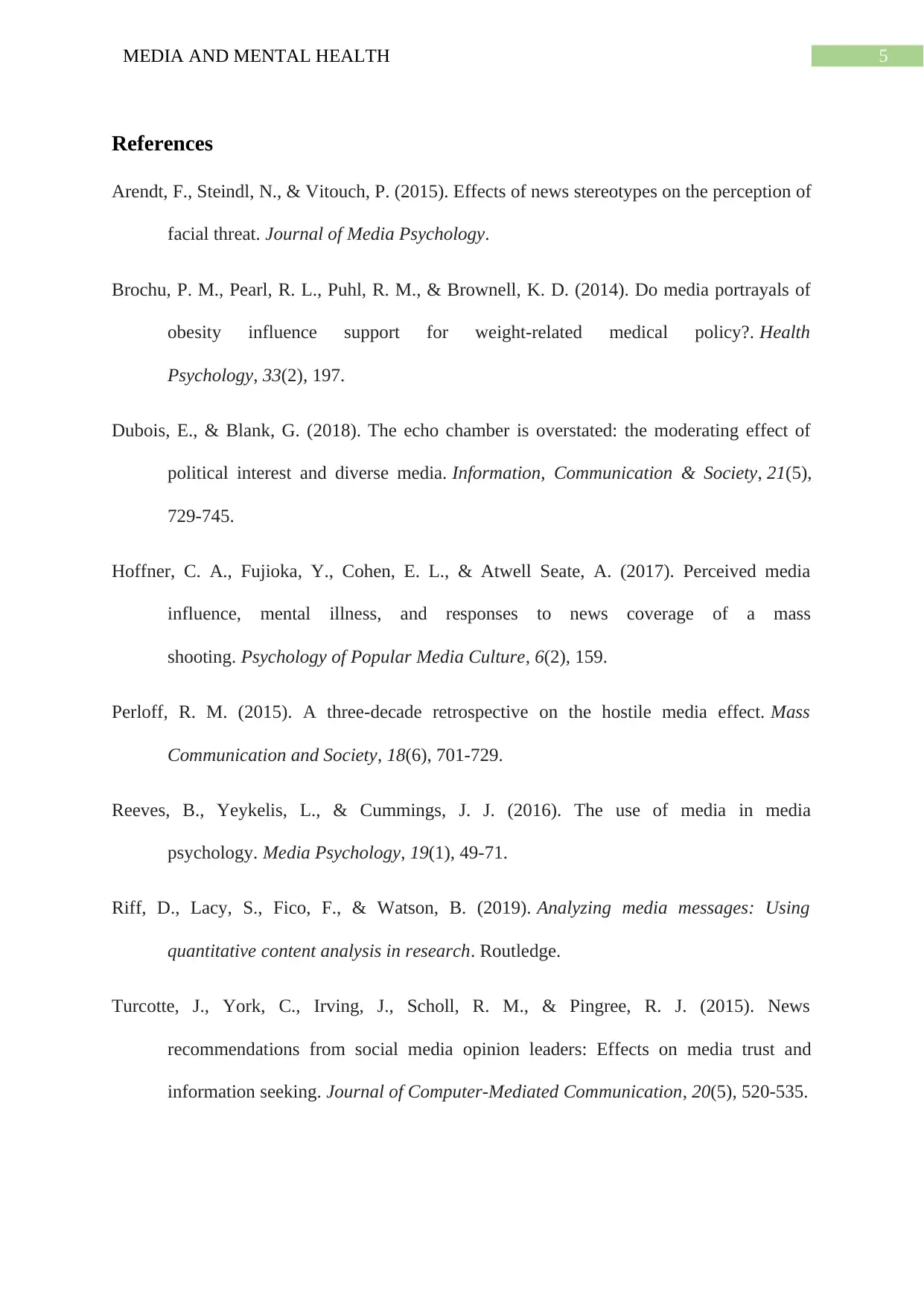
5MEDIA AND MENTAL HEALTH
References
Arendt, F., Steindl, N., & Vitouch, P. (2015). Effects of news stereotypes on the perception of
facial threat. Journal of Media Psychology.
Brochu, P. M., Pearl, R. L., Puhl, R. M., & Brownell, K. D. (2014). Do media portrayals of
obesity influence support for weight-related medical policy?. Health
Psychology, 33(2), 197.
Dubois, E., & Blank, G. (2018). The echo chamber is overstated: the moderating effect of
political interest and diverse media. Information, Communication & Society, 21(5),
729-745.
Hoffner, C. A., Fujioka, Y., Cohen, E. L., & Atwell Seate, A. (2017). Perceived media
influence, mental illness, and responses to news coverage of a mass
shooting. Psychology of Popular Media Culture, 6(2), 159.
Perloff, R. M. (2015). A three-decade retrospective on the hostile media effect. Mass
Communication and Society, 18(6), 701-729.
Reeves, B., Yeykelis, L., & Cummings, J. J. (2016). The use of media in media
psychology. Media Psychology, 19(1), 49-71.
Riff, D., Lacy, S., Fico, F., & Watson, B. (2019). Analyzing media messages: Using
quantitative content analysis in research. Routledge.
Turcotte, J., York, C., Irving, J., Scholl, R. M., & Pingree, R. J. (2015). News
recommendations from social media opinion leaders: Effects on media trust and
information seeking. Journal of Computer-Mediated Communication, 20(5), 520-535.
References
Arendt, F., Steindl, N., & Vitouch, P. (2015). Effects of news stereotypes on the perception of
facial threat. Journal of Media Psychology.
Brochu, P. M., Pearl, R. L., Puhl, R. M., & Brownell, K. D. (2014). Do media portrayals of
obesity influence support for weight-related medical policy?. Health
Psychology, 33(2), 197.
Dubois, E., & Blank, G. (2018). The echo chamber is overstated: the moderating effect of
political interest and diverse media. Information, Communication & Society, 21(5),
729-745.
Hoffner, C. A., Fujioka, Y., Cohen, E. L., & Atwell Seate, A. (2017). Perceived media
influence, mental illness, and responses to news coverage of a mass
shooting. Psychology of Popular Media Culture, 6(2), 159.
Perloff, R. M. (2015). A three-decade retrospective on the hostile media effect. Mass
Communication and Society, 18(6), 701-729.
Reeves, B., Yeykelis, L., & Cummings, J. J. (2016). The use of media in media
psychology. Media Psychology, 19(1), 49-71.
Riff, D., Lacy, S., Fico, F., & Watson, B. (2019). Analyzing media messages: Using
quantitative content analysis in research. Routledge.
Turcotte, J., York, C., Irving, J., Scholl, R. M., & Pingree, R. J. (2015). News
recommendations from social media opinion leaders: Effects on media trust and
information seeking. Journal of Computer-Mediated Communication, 20(5), 520-535.
⊘ This is a preview!⊘
Do you want full access?
Subscribe today to unlock all pages.

Trusted by 1+ million students worldwide
1 out of 6
Related Documents
Your All-in-One AI-Powered Toolkit for Academic Success.
+13062052269
info@desklib.com
Available 24*7 on WhatsApp / Email
![[object Object]](/_next/static/media/star-bottom.7253800d.svg)
Unlock your academic potential
Copyright © 2020–2026 A2Z Services. All Rights Reserved. Developed and managed by ZUCOL.





